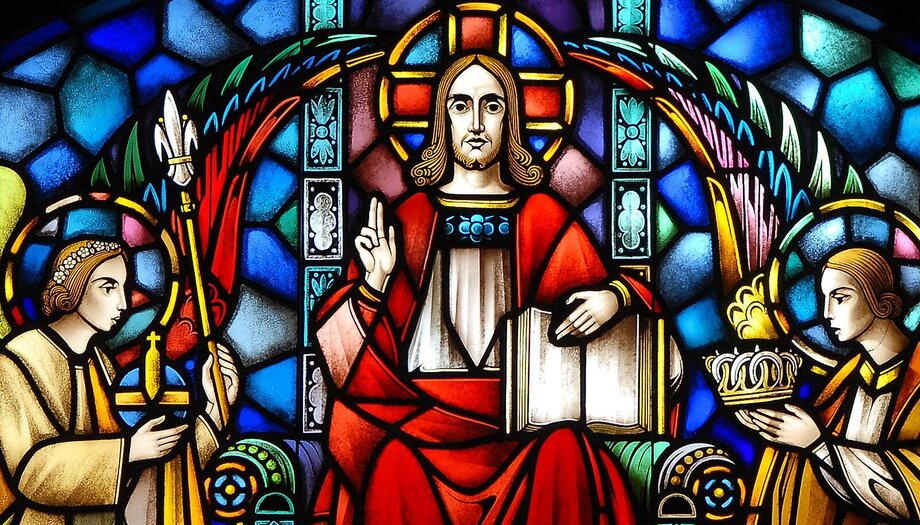Here too, as in the Preface I of AdventThe eschatological character of this part of the time of preparation for Christmas is predominant.
It is indeed fair to thank you,
it is our duty to sing in your honor
hymns of blessing and praise,
Almighty Father, beginning and end of all creation.
You have hidden the day and the hour from us
in which Christ, your Son,
Lord and Judge of history,
will appear, clothed in power and glory
above the clouds in the sky.
On that terrible and glorious day
the figure of this world will pass
and the new heavens and the new earth shall be born.
The same Lord who will then show Himself to us full of glory
is now coming to meet us
in every man and in every event
that we may receive him in faith
and by love let us bear witness
of the blissful expectation of his kingdom.
Therefore, as we await his final coming,
united with angels and saints,
we sing the hymn of your glory:
Holy, Holy, Holy...
The text presents a certain novelty from the beginning, since it shows an initial protocol different from that of most of the other Prefaces. From the very first expressions, it directs the contemplative gaze of the faithful towards God the Father Almighty, the beginning and end of all things: in this way it introduces us immediately into a perspective that is both cosmic and historical-eschatological.
The embolism of the preface consists of three sections, also indicated graphically in the text of the Missal. The first section recalls the text of Matthew 2436, in which Jesus himself affirms that no one knows the day and hour of the Son's final manifestation; these words in themselves constitute an invitation to vigilance, a typical theme of this time of Advent.
Then we turn to the prophetic vision of the second coming of Christ, when "they will see the Son of Man coming on the clouds of heaven with great power and glory" (Mt 24:30). He will come as Lord (cf. Acts 2:36) - which translates the Greek Kyriosand Judge (cf. Acts 10:42), that is, the one charged with establishing justice once and for all (cf. Rev 20:11-12).
From the "end times" to everyday life
The second section continues with the description of that last day and defines it as tremendous (cf. Gl 2:11) and glorious (cf. Ez 39:13 and Acts 2:20), adjectives that show the extraordinary nature of the moment, which instills fear and at the same time reveals the majesty of God (glorious is an adjective that usually refers to God). The vision, however, does not stop here, but opens to the grandiose contemplation of the new heavens and the new earth: the figure of this world passes away (cf. 1 Cor 7:31) and a new era begins, characterized no longer by fragility, but by fullness and definitiveness, as attested by the prophecies of Isaiah (cf. Is 65:17 and 66:22), later taken up by 2 Pet 3:13 and Rev 21:5.
In the Epistle to the Romans, Paul also directs his gaze toward this fullness when he says: "For the creation has been subjected to the fall (...) in the hope that the creation itself also will be set free from the bondage of corruption into the liberty of the glory of the children of God" (Rom 8:20-21). It is beautiful to observe how in this fresco of what will be, the material dimension is not only not despised, but on the contrary, it is exalted, in that recapitulation of all things that includes not only man, but the whole cosmos.
Finally, the third section of the Preface proposes to us the passage from this grandiose contemplation of the events of the "end times" to daily life: preparing for the coming of the Lord means above all opening our hearts to our neighbor and welcoming every person and every event; in the people the Lord places at our side and in the events that happen to us, God speaks. There is here an echo of the words of Gaudium et Spes 22: "By the incarnation, the Son of God has united himself in a certain way to every man".
The text concludes with a tripartite sentence, which highlights the necessity of the theological virtues for daily life: faith is necessary to be able to recognize Christ who makes himself present in the events of life and to be able to welcome this presence of his; charity is indispensable to bear witness to the Christian life, which is open to hope, that is, to the confident expectation of the fulfillment of God's plans of salvation for us.
Finally, precisely by nourishing the expectation of the second coming, we are invited to join the angels and saints in the singing of the Sanctus.
Pontifical University of the Holy Cross (Rome)









